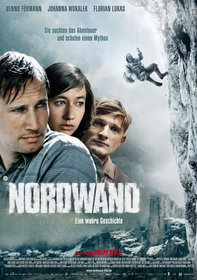
NORDWAND/NORTH FACE
Germany, 2008, 121 minutes, Colour.
Benno Furmann, Florian Lukas, Johanna Wakalek, Ulrich Tukur.
Directed by Filipp Stolzl.
An impressive piece of film-making, a must for those who follow mountain climbing. However, it is an extraordinarily gruelling film to watch if you are caught up in the characters and their efforts to climb the north face of the Eiger. We share the physical energy and exertion of the climbers, the hardships in scaling rock faces, in danger of falls and avalanches, the changes in weather and the exposure to the freezing temperatures. The photography is most impressive, with sweeping vistas of the mountain and close-ups of the men and their climb.
While this is the main impetus of Nordwand, there is a very interesting historical context. The year is 1936. Some German mountaineers have died the previous year on the side of the Eiger and Swiss authorities want to ban any attempts to reach the summit. In Germany itself, Hitler has been pushing ideals for German youth and the Berlin Olympics are imminent. Government and the newspapers are eager for German climbers to conquer the Eiger. The film shows the cynical bravado of this kind of Nazi propaganda and, ultimately, the disillusionment with this kind of manipulation.
Two young men, expert and enthusiastic, are persuaded to attempt the feat. An Austrian team catches up with them. What follows is a detailed following of the climb and all its difficulties. And this, as has been said, is extremely gruelling to watch and share. It is a relief when the the action returns frequently to the warmth and comfort of the chalet. Benno Fuhrmann and Florian Lukas are very good as the two climbers who found their place in mountaineering history as the postscript to the film indicates.
The screenplay is also critical of the role that media plays in these events, hyping stories for headlines and less interested in the human problems, noting that only success or tragedy are front-page-worthy.
1.A piece of history? Re-creation of the Nazi era? The mountain-climbing genre? The experience of climbing? The Eiger? Achievement?
2.A gruelling physical experience, identifying with the endurance, the pain, the suffering, death?
3.Berlin 1936, the newsreels about the attempts to conquer the Eiger, the deaths of the climbers, the Swiss ban on climbing? The newspaper, the chiefs and the discussions about the Olympic Games, the news? The Swiss sequences, the chalet and warmth? The Eiger, the visuals, the physical reality, the moods and weather, rock and snow? The tunnel and the train? The musical score?
4.The build-up to the 1936 Olympics, Hitler’s intentions, achievement, the glory of the Third Reich, German heroes and youth? Luise and her work, making the coffee, sitting in as secretary, sharing her memories? Her final disillusionment with the newspapermen, leaving for the United States? A symbol of the disillusionment with Nazism?
5.Berlin, the discussions, Luise and the coffee, her work as a photographer, buying the camera? Listening to the discussions, her love for Toni? The cynical reporters and wanting headlines?
6.The journalist and Luise going to Switzerland, in the comfort of the hotel, watching the climb, photographing the crowds, the phone stories to Berlin, the journalist wanting either heroism or a tragedy? His final talk to Luise and his offering an apology?
7.The people in Switzerland, watching? The various types, nationalities? The background of Leni Riefenstahl and her films about mountains? The Riefenstahl-type character? The women and their admiration? The men and their scepticism?
8.The picture of Toni and Andi, in the brigade, their love for the mountains, friendship since childhood, with Luise, the glimpses of them climbing mountains, their skills, the swinging from ledge to ledge? Their work in the brigade, cleaning the latrines? The dance, meeting Luise, her suggestion about the Eiger? Toni and his reaction, not wanting to go, Andi and his persistence? Toni’s change of heart? Their asking for leave of absence? Their cycling to the Eiger?
9.The plans, the various teams? The Austrians? The personalities? Toni as leader, Andi and his energy?
10.The early morning departure, their progress, the Austrians following, the Austrian being hit by the rock and being injured? His wanting to go on? Joining with Toni and Andi?
11.The photography of the mountain sequences, the climb, the physical endurance, the sweep of the cameras, the close-ups, the attention to detail, the difficulties, equipment, ropes, swinging, the bivouacs?
12.The Austrians, joining up, their efforts, Willi and his getting weaker, falling, the injuries?
13.The decision about going down, Andi wanting to go on? Toni and his conscience? Lifting Willi down, the endurance, Andi’s fall and cutting the rope? The deaths of the Austrians?
14.Toni, the cold, losing his glove, hanging, Luise going up the tunnel, enlisting the help of the driver? The night vigil? The rescuers and their refusal, the morning and their change of heart, the rescue attempts, the length of the rope? Luise and her presence, encouraging Toni, his death?
15.Luise, going to New York, photographing the black trumpeter? A symbol of the disillusionment with Nazism?
16.The aftermath, the desire to conquer Eiger, seeing it as a Swiss problem? The Germans and Austrians following Toni and Andi’s route, the conquering of the Eiger?
17.The value of this kind of enterprise? The energy driving the climbers, endurance? Motivations?